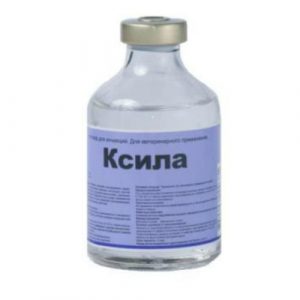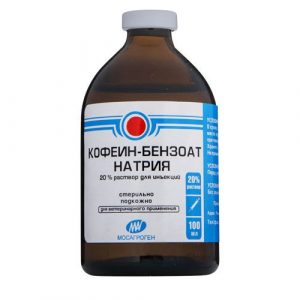Description
Pharmacological action of
Enrofloxacin, which is part of the drug, belongs to the group of fluoroquinolones, has a wide spectrum of antibacterial and antimycoplasmic effects, inhibits the growth and development of gram-positive and gram-negative bacteria, including Escherichia, hemophilus, pastelofelus, Staphylophylaceae, pastelles, sapiens, streptococci, clostridia, pseudomonads, bordetellae, campylobacter, corynebacterium, protea, as well as mycoplasmas. The mechanism of action of enrofloxacin is to inhibit the activity of the gyrase enzyme, which affects the replication of the DNA helix in the nucleus of a bacterial cell. With parenteral administration of the drug, enrofloxacin is well and quickly absorbed from the injection site and penetrates into all organs and tissues of the body. The maximum concentration of enrofloxacin in the blood is reached after 20 to 40 minutes, the therapeutic concentration remains for 24 hours after administration of the drug. Baytril 10% injection for the degree of exposure to the body refers to moderately hazardous substances, at recommended doses it is well tolerated by animals, does not have embryotoxic, teratogenic and hepatotoxic effects. Enrofloxacin is excreted from the body mainly unchanged, partially metabolized to ciprofloxacin and excreted in urine and feces.
Indications
Assign to calves and pigs for therapeutic purposes for infections of the respiratory system, gastrointestinal tract, genitourinary system, septicemia, colibacteriosis, salmonellosis, streptococcosis, bacterial and enzootic pneumonia, atrophic rhinitis, mastitis-metritis-agalactia syndrome and other diseases caused by microorganisms sensitive to fluoroquinolones, as well as in mixed and secondary infections with viral diseases.
Contraindications
Hypersensitivity to enrofloxacin and other quinolones. It is forbidden to prescribe to pregnant sows, with significant violations of the development of cartilage, lesions of the nervous system, accompanied by seizures, as well as the isolation of microorganisms resistant to fluoroquinolones from a sick animal. The simultaneous use of Baytril with chloramphenicol, macrolides, tetracyclines, theophylline and non-steroidal anti-inflammatory drugs is not allowed.
Special instructions
Slaughter of animals for meat is allowed 14 days after the last injection. The meat of animals forced to be killed earlier than the established deadline can be used for feeding fur animals or for the production of meat and bone meal.
Composition
In 1 ml of the injection solution, 100 mg of enrofloxacin and auxiliary components are contained in the active substance: potassium hydroxide, n-butanol, water for injection.
Dosage and administration of
Baytril 10% injection is administered to the calves subcutaneously, and to pigs intramuscularly at a dose of 2.5 ml per 100 kg of animal weight (2, 5 mg enrofloxacin per 1 kg of mass). The drug is prescribed once a day to calves for 5 consecutive days, to pigs for 3 days, and in the treatment of mastitis-metritis-agalactia syndrome to sows for 1 to 2 days. If within 3 – 5 days there is no noticeable clinical improvement, it is recommended to re-test the sensitivity of microorganisms isolated from a sick animal to fluoroquinolones or replace Baytril with another antibacterial drug. In connection with a possible painful reaction, the drug should be administered in an amount of not more than 5 ml in one place to the calves and not more than 2.5 ml to pigs.
Side effects of
In some cases, a short-term violation of the function of the gastrointestinal tract is possible. In pigs, irritation at the injection site may occur.
Storage conditions
Precautions (List B). In a dry, dark place inaccessible to children and animals at a temperature of 5 to 25 ° C. Expiration is 3 years. After opening the bottle, the drug can be used within 28 days.
Dosage form
injection for injections



